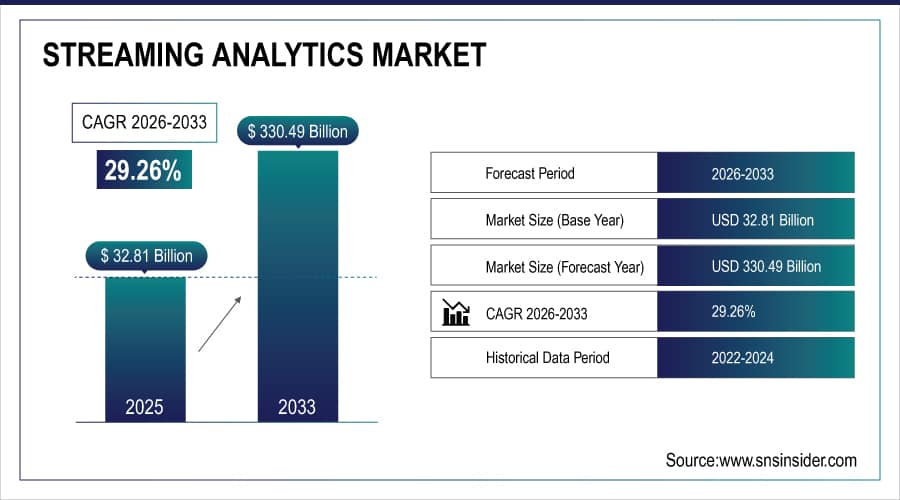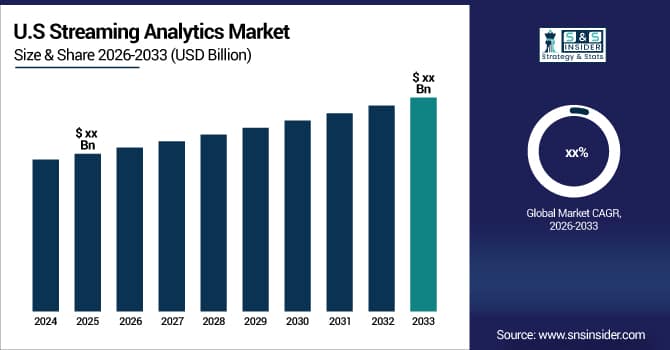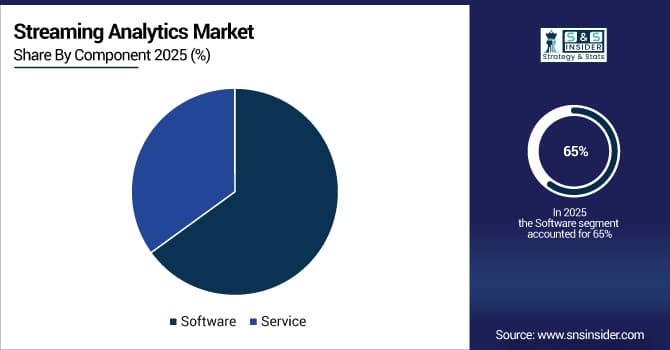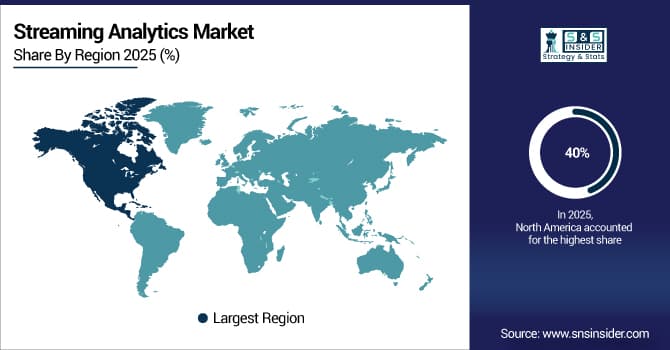Streaming Analytics Market Report Scope & Overview:
The Streaming Analytics Market was valued at USD 32.81 billion in 2025E and is expected to reach USD 330.49 billion by 2033, growing at a CAGR of 29.26% from 2026-2033.
Streaming Analytics Market is growing due to increasing adoption of real-time data processing across industries. Rising demand for actionable insights, AI and machine learning integration, and IoT data management drives growth. Businesses seek faster decision-making, improved operational efficiency, and enhanced customer experiences. Cloud-based platforms, advanced analytics tools, and growing digital transformation initiatives further accelerate adoption. Additionally, expanding use cases in finance, healthcare, retail, and manufacturing contribute significantly to market expansion.

To Get More Information On Streaming Analytics Market - Request Free Sample Report
Streaming Analytics Market Size and Forecast
-
Market Size in 2025E: USD 32.81 Billion
-
Market Size by 2033: USD 330.49 Billion
-
CAGR: 29.26% from 2026 to 2033
-
Base Year: 2025E
-
Forecast Period: 2026–2033
-
Historical Data: 2022–2024
Streaming Analytics Market Trends
-
Rising demand for real-time insights and decision-making is driving the streaming analytics market.
-
Growing adoption of IoT, big data, and AI-driven analytics is boosting real-time data processing capabilities.
-
Expansion across BFSI, retail, healthcare, manufacturing, and telecom sectors is fueling market growth.
-
Integration with cloud platforms, edge computing, and data visualization tools is enhancing scalability and usability.
-
Increasing need for operational efficiency, fraud detection, predictive maintenance, and personalized customer experiences is shaping adoption trends.
-
Advancements in low-latency, in-memory processing, and event-driven architectures are improving performance.
-
Collaborations between analytics vendors, cloud providers, and enterprise IT teams are accelerating innovation and deployment globally.

Streaming Analytics Market Growth Drivers:
-
AI and Machine Learning as Key Drivers of Streaming Analytics Market Growth Revolutionizing Data Processing and Decision-Making Across Industries
The integration of artificial intelligence (AI) and machine learning (ML) is a key factor driving growth in the streaming analytics market. These technologies enable advanced functionalities such as predictive insights, anomaly detection, and automated decision-making, which are crucial for processing real-time data streams. As businesses manage increasing volumes of data from sources like IoT devices, social media, and financial transactions, AI-driven analytics tools help identify patterns, forecast outcomes, and react to events in real time, improving operational efficiency and providing valuable, timely insights. Advancements in AI and ML, bolstered by significant venture capital investment in 2024, are further accelerating the adoption of streaming analytics platforms.
Streaming Analytics Market Restraints:
-
Overcoming Integration Challenges as the Key to Unlocking the Full Potential of the Streaming Analytics Market
Integration challenges pose significant restraints on the streaming analytics market, hindering its growth potential. Many organizations encounter difficulties when attempting to integrate streaming analytics solutions with their existing systems and workflows. The complexity of modern data architectures often requires specialized knowledge and expertise, which can strain internal resources. Furthermore, the need for skilled personnel to implement, maintain, and optimize these solutions complicates the integration process. This skills gap can lead to delays in deployment and underutilization of analytics capabilities, ultimately impacting the overall effectiveness of streaming analytics initiatives. Additionally, organizations may face compatibility issues with legacy systems, making it harder to achieve seamless data flow and real-time processing.
Streaming Analytics Market Segment Analysis
By Component, Software dominated the Streaming Analytics Market in 2025
The Streaming Analytics market component segment is primarily divided into software and services, with software commanding a significant share of approximately 65% of total market revenue in 2025. This dominance reflects the growing dependence of businesses on advanced analytics tools for effective real-time data processing. The software segment includes a range of solutions such as data integration, real-time processing, analytics, and visualization tools, which allow organizations to derive actionable insights crucial for decision-making in dynamic environments. The surge in big data, IoT, and the demand for immediate insights are driving the need for robust streaming analytics software.

By Deployment Model, Cloud-based streaming analytics led the market in 2025
The Streaming Analytics market is primarily divided into two deployment models: cloud and on-premises solutions, with the cloud model leading the way. In 2025, cloud-based streaming analytics represented about 60% of the total market revenue, emphasizing its growing significance for organizations in search of flexible, scalable, and cost-effective solutions. Cloud deployment offers remarkable scalability and flexibility, enabling organizations to adjust their analytics capabilities based on real-time demands without the need for substantial on-premises infrastructure investments. This adaptability is crucial for businesses experiencing variable data volumes due to seasonal fluctuations or unexpected market changes.
Regional Analysis
North America Streaming Analytics Market Insights
In the Streaming Analytics market, North America maintains a leading position, representing about 40% of total market revenue in 2025. This dominance is fueled by several key factors. The region is home to top technology companies that consistently drive innovation and improvements in streaming analytics solutions through substantial investments in research and development, enhancing real-time data processing capabilities. Industries like finance, healthcare, retail, and telecommunications are increasingly utilizing streaming analytics to gain actionable insights from real-time data, emphasizing the need for prompt decision-making and operational efficiency.

Get Customized Report as Per Your Business Requirement - Enquiry Now
Asia Pacific Streaming Analytics Market Insights
In 2025, the Asia-Pacific region emerged as the second-fastest-growing market for streaming analytics, highlighting its considerable growth potential. The region benefits from rapid technological advancements and an increase in digital transformation initiatives across various sectors. Countries such as China, India, and Japan are leading the way in adopting streaming analytics, motivated by the rising demand for real-time insights that enhance decision-making and operational efficiency. The proliferation of the Internet of Things (IoT) in Asia-Pacific significantly drives the need for streaming analytics, as connected devices generate massive volumes of data that organizations aim to analyze in real time.
Europe Streaming Analytics Market Insights
Europe’s Streaming Analytics Market is growing steadily due to increasing adoption of real-time data analytics and AI-driven insights across industries. Financial services, healthcare, and manufacturing sectors are leveraging streaming analytics for faster decision-making and operational efficiency. Cloud-based solutions, supportive regulatory frameworks, and digital transformation initiatives boost platform adoption. Additionally, rising IoT deployment, growing demand for predictive analytics, and technological advancements contribute to the market’s robust growth in Europe.
Middle East & Africa and Latin America Streaming Analytics Market Insights
The Middle East & Africa and Latin America Streaming Analytics Markets are expanding due to rising adoption of real-time data processing and analytics across industries. Growing digital transformation, IoT deployment, and demand for faster decision-making drive market growth. Cloud-based solutions, increasing investment in AI and machine learning, and supportive government initiatives enhance platform adoption. These factors create significant opportunities for streaming analytics in emerging economies across these regions.
Streaming Analytics Market Competitive Landscape:
Amazon Web Services, Inc. (AWS)
AWS, a global cloud leader, provides scalable, on-demand infrastructure and advanced data services. Its streaming and analytics offerings, including Amazon Kinesis, EMR, and SageMaker Lakehouse, enable enterprises to process real-time data at scale for analytics, AI, and operational intelligence. AWS focuses on serverless architecture, high availability, and integration with machine learning and analytics tools, empowering organizations to deploy real-time pipelines across hybrid and multi-cloud environments.
-
2024: At AWS re:Invent 2024, AWS announced next-generation streaming/analytics capabilities, integrating Amazon SageMaker Lakehouse with real-time streaming engines such as Flink and Kinesis.
-
2025: Expanded streaming-data support with Amazon EMR Serverless Streaming jobs in AWS GovCloud regions, enabling scalable, serverless real-time stream processing.
Google Cloud
Google Cloud provides intelligent, scalable cloud solutions for enterprises, with a strong focus on AI, analytics, and real-time data processing. Its Pub/Sub service supports high-throughput, low-latency messaging, enabling seamless ingestion and delivery of streaming data. Google Cloud emphasizes open-source compatibility, serverless operations, and integration with machine-learning pipelines and analytics engines, helping businesses operationalize real-time insights for analytics, IoT, and AI-driven decision-making across industries.
-
2024: Updated Pub/Sub streaming service with deep integration to Apache Flink via a managed, serverless “BigQuery Engine for Flink,” simplifying streaming-analytics workloads and improving real-time data processing capabilities.
Key Players
Some of the key Players in Streaming Analytics market along with their Product:
-
Amazon Web Services, Inc. (Amazon Kinesis)
-
International Business Machines Corporation. (IBM Streams)
-
Impetus Technologies, Inc. (StreamAnalytix)
-
Microsoft Corporation. (Azure Stream Analytics)
-
Oracle Corporation. (Oracle Stream Analytics)
-
SAP SE. (SAP HANA Streaming Analytics)
-
SAS Institute Inc. (SAS Event Stream Processing)
-
Software AG. (webMethods Integration Server)
-
SQLstream, Inc. (SQLstream Blaze)
-
TIBCO Software Inc. (TIBCO StreamBase)
-
Google Cloud. (Google Cloud Dataflow)
-
Cloudera. (Cloudera DataFlow)
-
Apache Flink. (Apache Flink)
-
Confluent. (Confluent Platform)
-
StreamSets. (StreamSets DataOps Platform)
-
DataStax. (DataStax Astra Streaming)
-
Fivetran. (Fivetran Streaming)
-
Talend. (Talend Data Integration)
-
Hazelcast. (Hazelcast Jet)
-
Red Hat. (Red Hat OpenShift Streams)
List of third party companies involved in the streaming analytics market, providing various tools, integrations, and services:
-
Confluent
-
StreamSets
-
Fivetran
-
Segment
-
MuleSoft
-
Talend
-
Apache Flink
-
Kinesis Data Firehose
-
Snowflake
-
Druid
| Report Attributes | Details |
|---|---|
| Market Size in 2025 | USD 32.81 Billion |
| Market Size by 2033 | USD 330.49 Billion |
| CAGR | CAGR of 29.26% From 2026 to 2033 |
| Base Year | 2025 |
| Forecast Period | 2026-2033 |
| Historical Data | 2022-2024 |
| Report Scope & Coverage | Market Size, Segments Analysis, Competitive Landscape, Regional Analysis, DROC & SWOT Analysis, Forecast Outlook |
| Key Segments | • by Component (Software and Service), by Deployment Model (On-premise and Cloud) • by Organization Size (Large Enterprises and Small & Medium-sized Enterprises) • by Application (Fraud Detection, Predictive Asset Management, Risk Management, Network Management, and Optimization, Sales and Marketing, Supply Chain Management, Location Intelligence, Others) • by Industry Vertical (BFSI, IT and Telecom, Manufacturing, Government, Retail and E-Commerce, Media and Entertainment, Healthcare, Energy and Utilities, and Others) |
| Regional Analysis/Coverage | North America (US, Canada, Mexico), Europe (Eastern Europe [Poland, Romania, Hungary, Turkey, Rest of Eastern Europe] Western Europe] Germany, France, UK, Italy, Spain, Netherlands, Switzerland, Austria, Rest of Western Europe]), Asia-Pacific (China, India, Japan, South Korea, Vietnam, Singapore, Australia, Rest of Asia-Pacific), Middle East & Africa (Middle East [UAE, Egypt, Saudi Arabia, Qatar, Rest of Middle East], Africa [Nigeria, South Africa, Rest of Africa], Latin America (Brazil, Argentina, Colombia, Rest of Latin America) |
| Company Profiles | Amazon Web Services, IBM, Microsoft, Oracle, SAP, SAS Institute, Software AG, SQLstream, TIBCO Software, Google Cloud, Cloudera, Apache Flink, Confluent, StreamSets, DataStax, Fivetran, Talend, Hazelcast, and Red Hat. |

